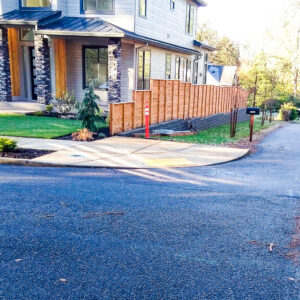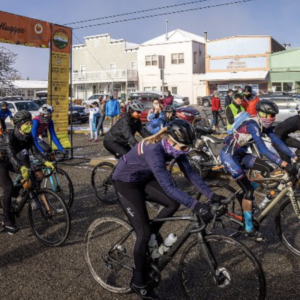
(Photo © J. Maus)
Welcome to Part Four of our six-part, guest article series on bike sharing in Portland.
The series is written by Tom Miller, chief of staff for Portland City Commissioner and Mayor-elect Sam Adams. On Friday, Tom shared experiences from the bike share system in Stockholm, Sweden, which is operated by Clear Channel (Clear Channel also had a bid in to manage Portland’s system).
In today’s article, Tom reflects on their trip to Scandinavia and ponders on what’s at stake for Portland.
Part Four: What’s at stake for Portland
We returned to Portland feeling clear we had made a good decision to proceed with caution. It’s easy to get excited about prospects of a bike share program in Portland. But it would be a great disservice to roll out a program that failed.
“You get one chance to make that first impression with your would-be user.”
It is evident that the investment would need to be substantial. Multiple millions of dollars. That’s because one of the take-home messages from cities around the world is that the initial roll-out of bikes and stations needs to be ubiquitous.
I referenced Paris earlier. It is currently the darling of the movement. Paris put out 10,000 bikes in one weekend. Shortly thereafter, it committed to doubling that number by the end of the calendar year. By contrast, the experiment in Brussels, Belgium is considered a failure by most because the number of bikes and stations initially distributed were too few. You get one chance to make that first impression with your would-be user.
The stakes are high. Anything new Portland does for bikes has national profile. Our local culture’s distaste for private advertising in the public right of way means our program would likely need to be funded with taxpayer dollars. Global best practices suggest the initial investment needs to be meaningful. We have to get it right the first time.
Tomorrow; Part Five: Questions to answer if we want to “get it right”.






One quote from this article convinces me why we should not pursue this:
Our local culture’s distaste for private advertising in the public right of way means our program would likely need to be funded with taxpayer dollars.
This is not something for government to undertake. If they can grease the skids (zoning, waiving biz fees, etc.) for a private vendor who sees profit in such a system then that is appropriate. Spending limited tax dollars on a program with very limited appeal and little assurance of success seems foolhardy. I fear this will result in many expensive and limited functionality bikes sitting around unused for most of the year for a little light tourist usage during the summer.
Why is such a system needed? I have yet to hear a solid rationale and just being “bikey” or “Eurocool” does not justify public ownership. If something very broadly useful like Bike Republic can’t get going then what chance does this concept really have?
There is no truth to assumption a huge roll out has to occur. How huge 500, 1000, 2000, 10,000 bikes? The ‘Roue Libre’ program in Paris started small, 2000 bikes then over five years grew to 5000. This build up led the public, both car drivers and riders, into familiarity of public bikes being present on the streets. Then JC Decaux invented Velib, with 8000 bikes released (not 10,000) in one month, true most were released on Bastille Day.
In Lyon the numbers were smaller, in 2005 there were 2000, in 2006 there were 3500, it grew as such.
In Barcelona the initial fleet was small, less than 2000, over the last 2 years and with over $7 million invested the numbers grew to just over 4000.
The point is, the acceptance of public bikes had to grow first, to become true infrastructure, not just a flash in the pan.
Public bikes do work; over 4 years a small town in California (Arcata, population 16000) LibraryBikes.org released 4000 individual bikes to people to ride. So a start of 500 bikes in Portland is not huge.
As far as advertising goes look what Hamburg did, they came out millions ahead! “Hamburg made its decision in October: from now on JCDecaux and Ströer are to split the advertising rights(to the city), and in exchange Hamburg will receive a total of €508 million. The city will then hold a separate tender process for a bike rental scheme at the beginning of next year” Business Week,November 2, 2007.
http://www.businessweek.com/globalbiz/content/nov2007/gb2007112_574198.htm